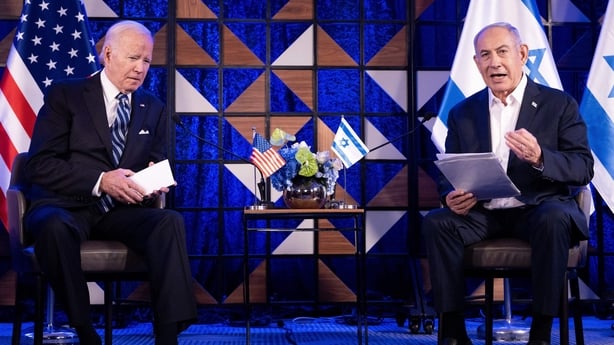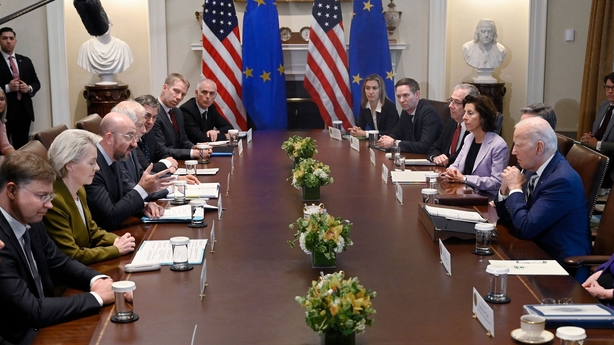"We're facing an inflection point in history - one of those moments where the decisions we make today are going to determine the future for decades to come."
The opening words of President Joe Biden's address to America on Thursday night got straight to the point: The US is picking sides in foreign wars because it matters.
It matters to America, to American allies, American values and the American way of seeing the world.
Above all, it matters to America's own safety and security.
And not just now, but for a long time to come.
At home in the US, the waning interest in the war in Ukraine, the new horrors manifested by the Hamas attack on Israel, the incendiary risk to the whole region that flows from the response in Gaza, and the toxic domestic politics on Capitol Hill all combine to present a moment of massive danger, especially to a president who has long cast himself in the role of foreign policy expert.
He is also not averse to taking risks - political, and in the case of this week's trip to Israel, physical as well.
Tel Aviv is still under occasional rocket fire, and Air Force One landing in the airport was one juicy fat target.
Think of all the security in place for Mr Biden's visit to Ireland - probably the safest place outside the US for a president to visit. Then think of what was needed to go to Israel - very definitely not the safest place for a US president right now.
But there was a reason to go, the chance to influence events in ways that might help to avert a slide into regional interstate war.
His Secretary of State, Antony Blinken's shuttle diplomacy across the region had paved the way. Things might happen for the better if the US President could meet the Israelis, Egyptians, Jordanians and Palestinian Authority leaders. And Biden is reputed to like old school, face to face politics: dislikes phone calls, hates Zoom and the like.
And something did happen - but not in a positive way. The explosion at the Baptist Hospital in Gaza threatened to upend the trip.
It did lead to the cancellation of the meetings with the Arab leaders - though Biden did talk to all of them by the second best method of telephone.
Most significant was the phone call with the Egyptian leader Abdel Fattah al Sisi from a refueling stop at Ramstein airbase in Germany, securing his permission to use the Raffa crossing into Gaza as a way of getting aid in.
It was a gruelling trip for anyone, let alone an 80-year-old, but it seemed to energise him.
His five decades of experience amid the political peaks of the US foreign policy establishment meant he could go to Tel Aviv, make an emotional speech giving encouragement and support to the Israelis, and pull out a typical Joe Biden yarn about meeting Golda Meir, before the 1973 Yom Kippur war, in which Israel was caught by surprise.

She led the country to victory, but was blamed at the subsequent election, which ended her political career. Maybe it was just a reminiscence, or maybe it was a dart thrown in the direction of Israel's current Prime Minister, Benjamin Netanyahu. Biden had used the same story before he left for Tel Aviv, so maybe it was a dart.
On the plane back to Washington, Biden told reporters that he had been very frank and direct in his discussions with Netanyahu - another leader he has known for decades.
He was particularly blunt in his assertion that Israel has to take the humanitarian situation of Palestinian civilians into account.
"I was very blunt with the Israelis," he said. "And look, Israel has been badly victimised. But, you know, the truth is that if they have an opportunity to relieve suffering, of people who have nowhere to go, that's what they should do.
"And if they don't, they'll be held accountable in ways that may be unfair, but that's what we'll do. And my point to everyone is, look, if you have an opportunity to alleviate the pain, you should do it, period. And if you don't, you're gonna lose credibility worldwide. And I think everyone understands that."
The Oval Office speech
Encouraged by the opening of a chance to get humanitarian aid into Gaza, and with it perhaps the opening of a chance to engage diplomatically to de-escalate an extremely dangerous regional situation, the President decided to address the national television audience from the Oval Office - only the second time he has chosen to do so during his presidency.
The high level pitch to the people was: America is safer by engaging with the world, not retreating from it.
He doesn't want to send troops anywhere in a new round of "forever wars" - but he does want to spend money to support key objectives of US foreign policy. $106 billion is the current ask.
"It's a smart investment that's going to pay dividends for American security for generations, help us keep American troops out of harm's way, help us build a world that is safer, more peaceful, and more prosperous for our children and grandchildren.
"In Israel, we must make sure that they have what they need to protect their people today and always.
"The security package I'm sending to Congress and asking Congress to do is an unprecedented commitment to Israel's security that will sharpen Israel's qualitative military edge, which we've committed to - the qualitative military edge.
"We're going to make sure Iron Dome continues to guard the skies over Israel. We're going to make sure other hostile actors in the region know that Israel is stronger than ever and prevent this conflict from spreading."
Ukraine
As it happens, Golda Meir was born in Kyiv, when it was part of the original Russian Empire. Now Biden has thrown his lot in with another leader in Kyiv, who is trying to keep his country out of a freshly expansionist Russia.
Biden's clearsighted support of Ukraine, and his co-ordination of a 50-strong international coalition of other countries backing the Ukrainian cause, was considered the highpoint of his Presidency in Foreign Policy to date. A big part of Thursday's speech was a justification of Americas support for Ukraine.
"Let me share with you why making sure Israel and Ukraine succeed is vital for America’s national security.
"You know, history has taught us that when terrorists don't pay a price for their terror, when dictators don't pay a price for their aggression, they cause more chaos and death and more destruction.
"They keep going, and the cost and the threats to America and to the world keep rising.
"So, if we don't stop Putin's appetite for power and control in Ukraine, he won’t limit himself just to Ukraine. Putin has already threated to 'remind' - quote, 'remind' Poland that their western land was a gift from Russia.
"One of his top advisers, a former president of Russia, has called Estonia, Latvia, and Lithuania Russia's 'Baltic provinces'.
"And if we walk away and let Putin erase Ukraine’s independence, would-be aggressors around the world would be emboldened to try the same.
"The risk of conflict and chaos could spread in other parts of the world - in the Indo-Pacific, in the Middle East - especially in the Middle East."
And in defiance of a majority of Republican's in the House of Representatives, he lumped the $14 billion he wants for Israel, and $10bn for extra humanitarian assistance, in with a request for $60bn in funds for Ukraine.
But he also played to the gallery of those calling for American money to be spent in America: $14bn for extra security on the Mexico border, and pointing out that fully half the money earmarked for Ukraine will be spent in American factories, employing American workers to make munitions for the American military, who will replace all the military hardware they are giving to Ukraine with newer versions for US defence.
EU-US Summit
Yesterday, EU top brass came to Washington for an EU-US Summit.
Council President Charles Michel, and Commission President Ursula von der Leyen, a week on from her own diplomatically tricky visit to Israel, led a top level delegation to meet the US side in the White House cabinet room.
Their joint statement afterwards noted that the world had changed "in unprecedented ways" since the last summit in the summer of 2021.
So most of their statement was taken up with the crises in Israel and Ukraine: "We condemn in the strongest possible terms Hamas and its brutal terrorist attacks across Israel. There is no justification for terrorism.
"We affirm Israel’s right to defend itself against these heinous attacks, in line with international law, including international humanitarian law.
"We will work closely with partners in the region to stress the importance of protecting civilians, supporting those who are trying to get to safety or provide assistance, and facilitating access to food, water, medical care, and shelter.

"We are concerned by the deteriorating humanitarian crisis in Gaza. It is crucial to prevent regional escalation. We call for the immediate release of all hostages and emphasise our shared view that a two-state solution remains the viable path to lasting peace.
"The United States and the European Union remain unwavering in our long-term political, financial, humanitarian, and military support to Ukraine and its people as they defend themselves against Russia’s illegal and unprovoked war of aggression.
"We stand together in calling for Russia to end its brutal war and to withdraw its military forces and proxies and military equipment immediately, completely, and unconditionally from the entire internationally recognised territory of Ukraine.
"We are committed to supporting Ukraine for as long as it takes to defend its sovereignty and territorial integrity.
"We recognise the urgency of ensuring that Russia does not succeed in collapsing the Ukrainian economy and of intensifying our efforts to help ensure assistance meets Ukraine's highest priority needs."
Capitol Hill
The President's address to the nation was also aimed at the warring factions in the Republican party on Capitol Hill. Without a speaker of the House, the Congress cannot pass the legal authority for the President to spend the foreign aid money he wants to spend.
In the television address he said this is not the time for party politics to get in the way.
"I know we have our divisions at home. We have to get past them. We can't let petty, partisan, angry politics get in the way of our responsibilities as a great nation."
The next day, the challenge of Jim Jordan to be Speaker of the House of Representatives - the candidate backed by Donald Trump, and a favourite of the faction that wants to end US funding for Ukraine - failed in his third attempt to become speaker, the majority of the Republican party then voting to remove him as the majority's nominee to be Speaker.
The chaos on the Hill continues - the same chaos that saw a $6bn tranche of aid for Ukraine excised from the temporary funding arrangement that expires in the middle of next month, returning us to the threat of another government shutdown.
But the political undermining of Jim Jordan too feels like an inflexion point in this saga.
Hostages
Just as the meeting with the EU leaders was finishing on Friday, news came through that two US hostages had been released by Hamas.
The President was reported to be overjoyed, and spoke to them by phone that evening.
Opinion polls are still showing strong net negative sentiment about the Biden presidency - with one exception: a net positive view of his handling of the Israel Gaza crisis.
This weekend, at his retreat in Rehoboth beach Delaware, the president can reflect on how it's been a good week to be Joe Biden.
A new week in politics starts Monday morning.






